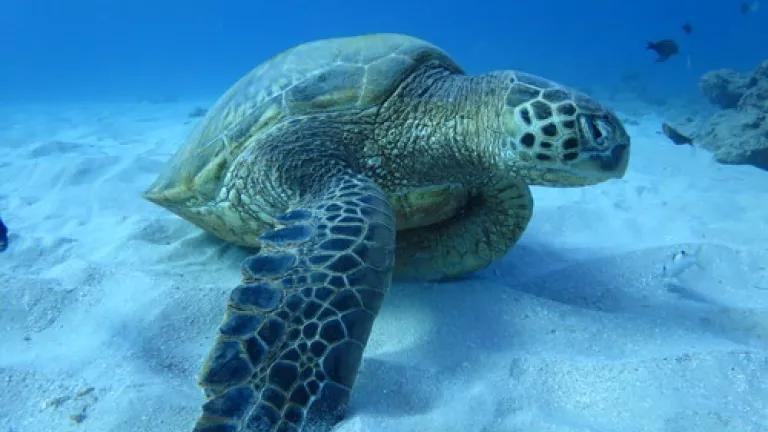
(C) Ian Kennedy
While many Americans have heard about the elephant and rhino poaching crises by now, the tragic fact is that there are hundreds of other species that the international wildlife trade is driving to extinction. Take pangolins--a little-known, scaled creature living in Africa and Asia that has become the most heavily-trafficked animal in the world due to Asian culinary and medicinal uses. Or sea turtles, all seven species of which are endangered from hunting and illegal egg collection.
Fortunately, on November 3, Washington voters will have a chance to help save some of these creatures by passing ballot initiative I-1401. Similar to the monumental ivory and rhino horn bans NRDC has helped pass in New York, New Jersey, and, most recently, California, the measure would prohibit the purchase, sale, and distribution of products made from a list of 10 endangered animals: elephants, rhinos, lions, tigers, leopards, cheetahs, marine turtles, pangolins, sharks, and rays. Also like the bills we have passed, the I-1401 will significantly increase penalties for wildlife traffickers in Washington to up to five years in prison and $10,000 in fines.
Of course, the National Rifle Association has opposed the measure, claiming that it would do nothing and is unnecessary given federal measures to fight wildlife trafficking. Both claims are false. The measure will most certainly benefit endangered species as the U.S. is actually a destination for many of them, as evidenced by the long lists of seizures the U.S. Fish and Wildlife Service ("Service") has made (see, for example, here, here, and here). Once in the U.S., a great deal of illegal wildlife is also re-exported to feed international demand. Indeed, according to the LEMIS database, between 2003 and 2013, almost 50,000 illegal wildlife items were seized upon exiting the country. Washington's container ports in Seattle and Tacoma are some of the most heavily utilized in the country so you can be sure they have a part to play in all this. If we can reduce U.S. demand for these products, we can impact poaching on the ground in other countries. And while it's true that the Service has taken steps on the federal level to control the ivory trade, they lack the authority to regulate intrastate trade, which is why state action is so vitally important.
So all you Washingtonians, fight back against wildlife trafficking -- the second greatest direct threat to species behind habitat loss -- on November 3 by voting yes on I-1401. And the rest of you, let's cheer Washington on as they take this important and inspiring step!

